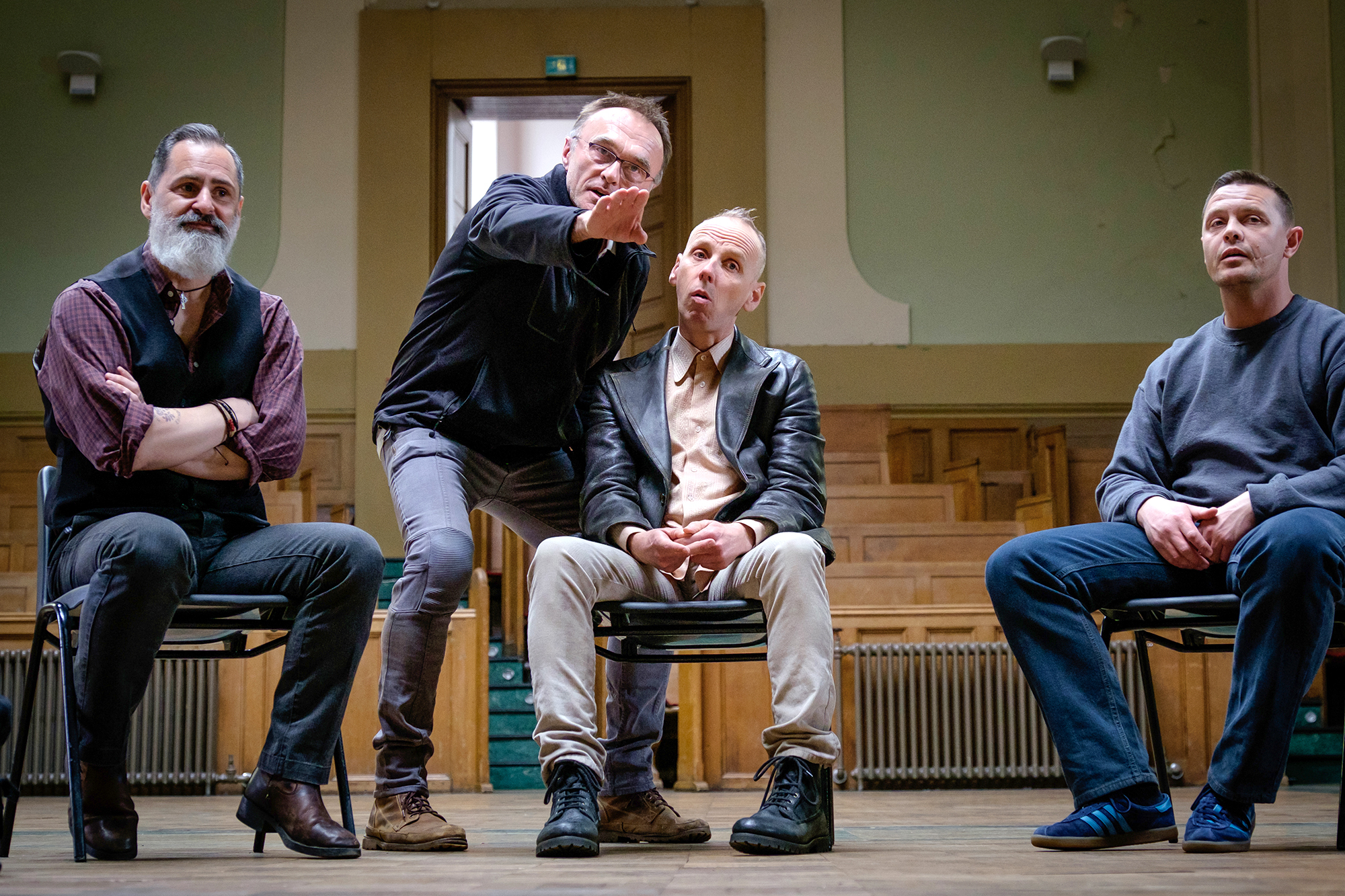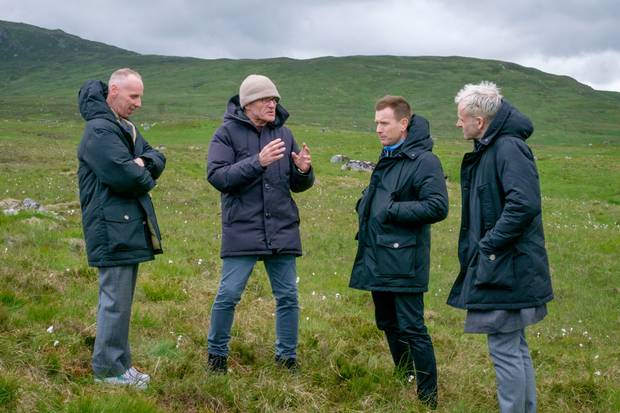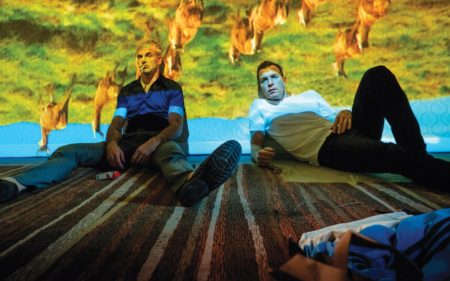Danny Boyle, the celebrated British filmmaker who won the Oscar for 2008’s Slumdog Millionaire, makes pictures—notably Shallow Grave, 28 Days Later, The Beach, 127 Hours and Steve Jobs—that are visual and aural tapestries of throbbing momentum, precisely shot, edited and scored, aces at seizing an audience, whether saving the world from a global pandemic, saving a man trapped in a canyon crevasse or saving Steve Jobs from himself.
In an update of perhaps his most beloved film, the merry band of Edinburgh heroin addicts that blazed through Boyle’s 1996 surprise hit Trainspotting returns twenty years later in a surprisingly thoughtful T2: Trainspotting. A shrewdly effective movie that manages the neat trick of having its characters reflect with melancholy on shenanigans we all found so entertaining at the time, Boyle’s new movie has some of its predecessor’s manic irreverence, but is largely driven by the bittersweet currents of a forty-something male in a mid-life crisis, trying to recapture his glory days while everything around him has changed.
T2: Trainspotting reunites original stars Ewan McGregor, Ewen Bremner, Jonny Lee Miller and Robert Carlyle, returning to settle old scores and target a few unsuspecting new marks. But after the picture settles in, they discover that you really can’t go home again. T2: Trainspotting is a movie not merely content to trade on something we might have expected—slickly drug-induced hijinks, redux—but rather one that asks questions about the spoils of aging and the value of nostalgia.
I caught up with Boyle recently to chat about T2: Trainspotting and its observations on the male ego and identity, why he chose revisit his now-classic and about what makes his movies so damned electric.
Let’s talk about your decision to return to these characters and milieu.
It’s partly because of you. Most films that you do, whether successful or not, they fade away either graciously or ungraciously. They have a kind of half-life and are gone, really. Trainspotting didn’t. It remained in many peoples’ minds and in journalist’s minds. So every film that I made I would end up talking about that one. And I’d joke, ‘Yeah, we’d do a sequel, but the actors don’t look old enough yet and they are always at the spas and give the impression that they are hard drinkers but actually moisturize with Crème de la Mer.’ But eventually it becomes, ‘So when is it going to happen?’ And it sort of becomes a self-fulfilling prophecy.
Irvine Welsh had written one.
Irvine wrote a sequel, Porno, which is like a ten years later sequel, written seven years after the original film came out. We did have a look at that and it was terrible; not worthy of the original film and we knew if we did that we would get killed. People would go, ‘Fuck off. How dare you? You just cashed in. These people meant something to us. Wasn’t the first film meant to be anti-commercial? Wasn’t it about turning your back on stuff like that?’ So we forgot about it and didn’t even show it to the actors.
Yet eventually you found a way into this.
When the twenty-year anniversary (of Trainspotting) was on the horizon, we thought we would have one last go. We went up to Edinburgh—me, writer John Hodge, Irvine and a couple of producers—and I think we all thought it wouldn’t work. But what emerged was something a bit more personal about male behavior over time. It allowed for this wonderful concoction with certain scenes that take no prisoners and have no respect for anybody and plow on through, like the caper scene in the first film. You get the sense of them reaching to the glorious past and golden days, as men do. But you also get this other thing where they can’t quite sustain it like that anymore. And there comes a reckoning. That was the reason that we did it. You can have your cake and eat it. It can be the same, but different. So that’s really why we did it. There was a reason to believe it.
What reference points perhaps influenced these themes?
Michael Apted’s 7 Up series and Richard Linklater’s Boyhood. And a lesser-known comedy-drama series from when I was a kid called The Likely Lads. And it was from Newcastle, an industrial town in the Northeast and a place a bit like Chicago—a defiant, working-class city. Suddenly there were these two boys on the television who had impenetrable, working class accents and were very funny. It mesmerized the nation. Seven years later, they did this thing about what had happened to them, and the same actors came back to play the same characters. One of them had become middle class while the other remained a union man. It was amazing. I remember that vividly and thinking, ‘You can do that? It’s the same actor. He looks different, but he was the same.’
There are some great lines in the new film about nostalgia. One says that the world moves on, even when we don’t. Another is about being a tourist in one’s own life. By its midpoint, I think what this film was getting at was the idea that men of a certain age are stuck. They look at themselves as a summation of where they have been and they try to make sense of all that. Women, on the other hand—Shirley Henderson and Kelly McDonald, especially—have moved on. They say that women look forward because they have children. They look forward to the future and men always look back at the past.
That is so true.
I felt this movie really tapped into that. Not sure if the word is ‘stunted,’ but you know what I mean.
Yes. I think women age much better than men. They are much more realistic about measuring time, whereas men hang onto the past and we do it under the guise of sports obsessions and stuff like that. But what we are doing is trying to be twenty again all the fucking time. So you get to seventy and then…? The film becomes a study of that. And you are right; the agency of the women is quiet. They have either moved on like Kelly’s character, or have actually brought their children up to not be like these stupid men and to try to do something different. And the film, emotionally, moves towards recognizing that.
So Begbie, when he says the world moving on and ‘some of us don’t,’ is acknowledging that she has done a great job with that kid; better than this cyclical pattern of him and his father; of drinking and violence and abuse. There is a kid who will not follow that pattern. It is post-industrial as well. There is a certain tradition that has changed, whether you like it or not, and you have to move on from that. The kids have to be different. They can’t keep reliving that past. I think you are right. I think biological with women, like you say, because of children and the amount of time they have to have them, which is dictated by a force that is not their will, whether it’s body or creation or whatever it is that you say, they acknowledge that. And they have to dance to the beat of that drum, whereas men just drum.
You have a substantial theater background including directing Shakespeare. Do you feel that most contemporary works derive from his? That his masterpieces laid the foundation?
He was pretty impressive, but he wrote some terrible plays as well. Some of the comedies are just not funny. There is nothing worse than sitting through a Shakespeare comedy when you realize, ‘There’s three hours of this to go. Oh my God.’ He is obviously a huge force in English language storytelling, for sure. It’s something that comes out in the British acting. (The T2: Trainspotting actors) have breeding in that kind of storytelling and I think it gives you confidence as an actor. If you can go out there and make that Shakespeare work, especially if you can get laughs in a Shakespeare comedy, that fills you with a sense of achievement.
Their performances in the film are writ large.
One of the traditions of film is a kind of mumbled, ‘Don’t do anything’ realism. ‘Do less. Do even less. Even less than that.’ And of course the first Trainspotting, and now this one, are not that, because they are big performances. And coming back together, they automatically stepped into the big performances. When actors are unsure, they do nothing, because, ‘At least you won’t make a fool of yourself.’ This is the opposite. It’s big! They are big performances; almost like stage performances. Ewan Bremner’s performance is immense, gestural and his face is all over the place all the time. It is literally chaotic. I think that is why American movies like British villains. I am sure it is. They will play the villain; really play it. Evil.
I think we all sort of have an idea of what a Danny Boyle film looks like—how it feels, how it’s edited, how it moves, how it sounds, what it looks like, the color schemes—and we could probably talk about what we think your signature might be. I don’t think there are a lot of directors today that have a definitive aesthetic stamp on their movies. From your perspective, what makes a Danny Boyle film?
I can’t answer this purely. Some of it is affected by things people have said to me. For instance, one journalist said to me, ‘All your films are the same.’ I said, ‘I work quite hard to make them all really different.’ She said, ‘I know. You basically have a character who faces insurmountable odds and he overcomes them.’
That’s every movie, no?
That’s what I said! But there is that factor in them. You need those obstacles for drama. And you need to overcome them to make a movement, I do believe, toward a kind of hope or healing at the end; that you are doing to leave the movie feeling like that. I like that. And a lot of it is momentum. I believe in two things in the art form of movies. They are forward momentum storytelling. They always have been and always will be. The audience gives you ninety minutes of their time. Movies are propulsive and I believe in enhancing that in the experience. And literally until film became digital, the act of projection was momentum; the projector hurtled around at huge speed. Everything is about this forward momentum. And then time is the other thing that movies are about, because you can take that momentum and time, push them together and contract time so that it moves fast, or deliberately slow it down so that it’s painful. You can stop it and start it again. There is no other art form that does that. And I love that about it. The act of an audience in a traditional cinema is to contribute to that. They say, ‘My time is yours.’ It’s changing though because of fucking phones! It used to be that people gave you that time as well. But you take time and force it forward. You can freeze it, extend it and distort it. It’s an amazing art form like that. I hope those things infect my films, whatever the subject matter.





